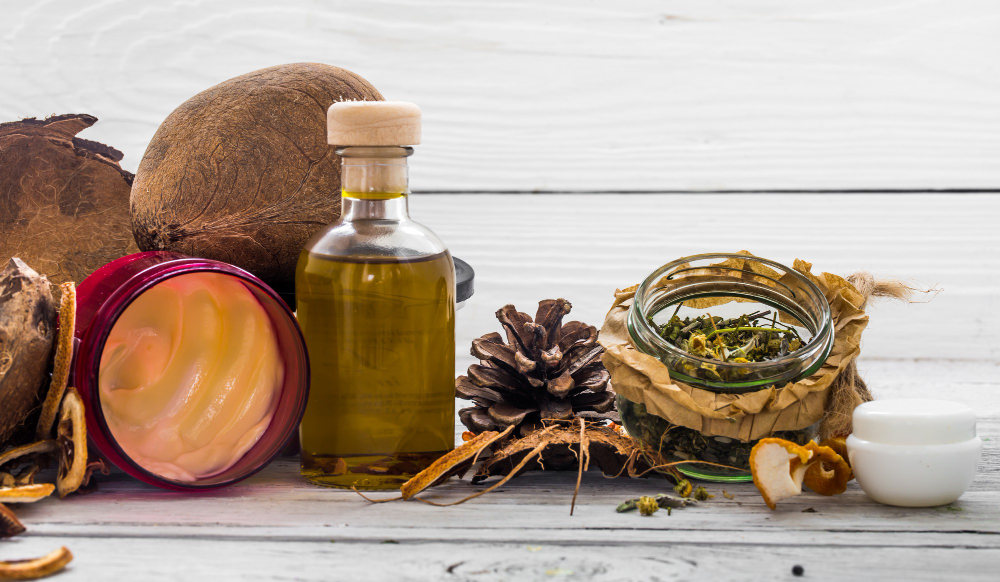Castor oil, derived from the seeds of the castor plant (Ricinus communis), has emerged as a cornerstone of natural wellness, revered for its myriad benefits and versatile applications. With a rich history spanning millennia, this remarkable oil continues to captivate the attention of modern-day enthusiasts seeking holistic remedies for a range of health and beauty concerns. In this comprehensive guide, we delve deep into the enchanting world of castor oil, uncovering its six key benefits and exploring the science behind its therapeutic properties.
1. A Powerful Laxative:
Its potent laxative effect is at the forefront of castor oil’s medicinal prowess, making it a time-honored solution for relieving constipation and promoting digestive health. The secret behind its efficacy lies in its high concentration of ricinoleic acid, a unique fatty acid that exerts stimulant laxative effects by activating smooth muscle contractions in the intestines. This action mechanism accelerates stool passage through the digestive tract, providing gentle yet effective relief from occasional constipation.
While castor oil’s laxative properties are well-documented, it’s important to exercise caution when using it for this purpose. Excessive consumption can lead to undesirable side effects such as diarrhea, cramping, and electrolyte imbalance. Therefore, following recommended dosage guidelines and consulting healthcare professionals if experiencing persistent digestive issues is advisable.
2. A Natural Moisturizer:
In the realm of skincare, castor oil reigns supreme as a deeply hydrating and nourishing moisturizer with unparalleled emollient properties. Rich in fatty acids, including ricinoleic acid, linoleic acid, and oleic acid, this botanical elixir penetrates the skin’s surface layers, delivering essential nutrients and moisture to parched and dehydrated skin.
Whether used alone or as an ingredient in skincare formulations, castor oil works wonders for replenishing moisture, softening rough patches, and restoring the skin’s natural barrier function. Its humectant properties help to attract and retain moisture, keeping the skin plump, supple, and resilient against environmental stressors. From soothing dry, chapped lips to nourishing rough elbows and heels, castor oil offers versatile solutions for addressing a myriad of skincare concerns.
3. May Promote Wound Healing:
In addition to its role as a digestive aid and skincare savior, castor oil has garnered attention for its potential to promote wound healing and support overall skin health. Emerging research suggests that its anti-inflammatory and antimicrobial properties may play a pivotal role in facilitating the repair and regeneration of damaged tissue.
The ricinoleic acid present in castor oil exhibits anti-inflammatory effects, which can help to reduce swelling, redness, and discomfort associated with wounds and skin injuries. Furthermore, its antimicrobial activity serves as a natural defense against infection, protecting vulnerable skin from harmful pathogens and promoting a sterile healing environment.
When applied topically to wounds, cuts, or abrasions, castor oil forms a protective barrier over the affected area, shielding it from external irritants and promoting optimal conditions for tissue repair. Its moisturizing properties also help to keep the skin hydrated, preventing dryness and minimizing the risk of scarring. Incorporating castor oil into wound care regimens may thus accelerate the healing process and promote more favorable outcomes for skin injuries of varying severity.
4. May Help Clean and Store Dentures:
Beyond its traditional roles in digestive health and skincare, castor oil offers surprising benefits for oral hygiene and denture care. Due to its antimicrobial properties and ability to dissolve impurities, it serves as an effective cleaning agent for dentures, helping to remove plaque, bacteria, and food particles that can accumulate on prosthetic teeth.
To clean dentures with castor oil, simply dilute a small amount of oil in warm water and use it to soak the dentures for a few minutes. Gentle brushing with a soft toothbrush can further enhance the cleaning process, ensuring that all surfaces are thoroughly cleansed. Rinse the dentures with water afterward to remove any residual oil or debris, leaving them fresh, clean, and free from odor-causing bacteria.
5. Supports Joint Health and Relieves Pain:
Castor oil’s anti-inflammatory prowess extends to supporting joint health and alleviating pain. Ricinoleic acid, its primary component, targets inflammation within the joints, reducing swelling and discomfort. By inhibiting pro-inflammatory cytokines, castor oil provides relief for conditions like arthritis and rheumatism.
When massaged onto affected joints, castor oil penetrates deeply, lubricating and easing stiffness. This lubricating action helps improve mobility, making daily activities more manageable. Regular application of castor oil can thus lead to improved joint function and enhanced quality of life for those dealing with chronic joint issues.
Moreover, castor oil’s natural properties make it a safe and effective alternative to conventional pain relievers. Unlike pharmaceutical medications, castor oil poses minimal risk of side effects and dependency. Its holistic approach addresses the root cause of joint pain, offering long-term relief without the drawbacks of traditional treatments.
6. Enhances Immune Function:
Castor oil’s immunomodulatory potential makes it a valuable ally in bolstering immune function. Ricinoleic acid and other bioactive compounds in castor oil influence the production and activity of immune cells. By enhancing immune cell function, castor oil strengthens the body’s defenses against pathogens and infections.
Furthermore, castor oil’s anti-inflammatory properties help maintain a balanced immune response. Chronic inflammation can compromise immune function and increase susceptibility to illness. By reducing inflammation, castor oil supports immune health and promotes overall well-being.
Incorporating castor oil into your wellness routine can thus fortify your body’s natural defenses. Whether applied topically or ingested, castor oil offers a gentle yet effective means of supporting immune function. By harnessing the power of castor oil, you can take proactive steps toward maintaining optimal health and vitality.
Can Castor Oil Support Hair Growth and Scalp Health?
One of the most celebrated benefits of castor oil lies in its ability to nourish the scalp, promote hair growth, and improve overall hair health. From ancient civilizations to modern-day beauty enthusiasts, this versatile oil has earned a stellar reputation as a go-to remedy for achieving luscious locks and a healthy scalp environment.
Furthermore, castor oil is rich in essential nutrients such as vitamin E, omega-6 fatty acids, and proteins, all of which play crucial roles in supporting healthy hair growth and preventing hair loss. Vitamin E acts as a potent antioxidant, protecting the hair follicles from oxidative stress and environmental damage, while omega-6 fatty acids nourish the scalp and promote circulation, ensuring that essential nutrients reach the hair roots.
When applied topically to the scalp and hair, castor oil provides a nourishing boost that penetrates deep into the hair follicles, strengthening the roots, and stimulating growth. Its thick consistency creates a protective coating around the hair shaft, sealing in moisture, and preventing breakage and split ends. Regular use of castor oil as a hair mask or scalp treatment can thus result in thicker, fuller hair, improved texture, and enhanced shine.
Castor Oil Precautions:
While castor oil offers a plethora of benefits for health and beauty, it’s essential to exercise caution when using it, particularly in high doses or for prolonged periods. Here are some important precautions to keep in mind:
- Dosage: When using castor oil as a laxative, it’s crucial to follow recommended dosage guidelines to avoid potential side effects such as diarrhea, cramping, and dehydration. Excessive consumption of castor oil can disrupt electrolyte balance and lead to nutrient malabsorption, so it’s best to use it sparingly and under the guidance of a healthcare professional.
- Skin Sensitivity: Before applying castor oil to the skin or hair, it’s advisable to perform a patch test to assess for any potential allergic reactions or sensitivities. Apply a small amount of oil to a small area of skin and wait 24-48 hours to observe for any signs of irritation, redness, or itching. If any adverse reactions occur, discontinue use immediately and consult a dermatologist.
- Pregnancy and Lactation: Pregnant and breastfeeding women should exercise caution when using castor oil, particularly as a laxative or for inducing labor. While small doses of castor oil are generally considered safe for occasional use, high doses may stimulate uterine contractions and potentially lead to preterm labor or miscarriage. It’s advisable to consult healthcare professionals before using castor oil during pregnancy or lactation.
- Oral Ingestion: While castor oil is commonly used as a laxative when taken orally, it’s important to avoid ingesting large quantities of the oil, as it can cause gastrointestinal upset and other adverse effects. Stick to recommended dosage guidelines and consult healthcare professionals if experiencing persistent digestive issues or discomfort.
Conclusion:
In conclusion, castor oil is a true marvel of nature, offering health, beauty, and overall well-being benefits. From its time-honored role as a powerful laxative to its modern-day applications in skincare, hair care, and oral hygiene, this versatile oil continues to captivate the hearts and minds of individuals seeking natural remedies for a variety of ailments.
Whether you’re looking to soothe a troubled scalp, revitalize lackluster locks, or enhance your daily skincare routine, castor oil offers a natural and effective solution that has stood the test of time. Embrace the magic of castor oil and experience the transformative power of this ancient elixir for yourself.
FAQs
- What are the key benefits of using castor oil for health and wellness?
Castor oil is renowned for its numerous health benefits, including promoting hair growth, moisturizing skin, relieving constipation, reducing inflammation, and aiding in wound healing. Additionally, it has antimicrobial properties that can help combat various infections. - How does castor oil promote hair growth?
Castor oil is rich in ricinoleic acid, which stimulates blood circulation to the scalp and nourishes the hair follicles. This encourages hair growth and also helps to prevent hair loss. Regular application of castor oil can result in thicker, healthier hair over time. - Can castor oil be used for skincare?
Yes, castor oil is an excellent natural moisturizer for the skin. It penetrates deeply into the skin, hydrating it and locking in moisture. Its anti-inflammatory properties make it beneficial for soothing irritated skin conditions like acne, eczema, and dermatitis. Additionally, it can help fade scars and stretch marks with consistent use. - How does castor oil work as a laxative?
Castor oil is a potent laxative due to its high concentration of ricinoleic acid. When ingested, it stimulates the smooth muscles of the intestines, promoting bowel movement and relieving constipation. However, it should be used sparingly and under the guidance of a healthcare professional, as excessive use can lead to dependency and electrolyte imbalances.
- How Does Automated Scheduling Save Time and Boost Engagement? - April 16, 2025
- 21 Delicious High Protein Foods - May 31, 2024
- Black Seed Oil: Health and Beauty Benefits - May 30, 2024




